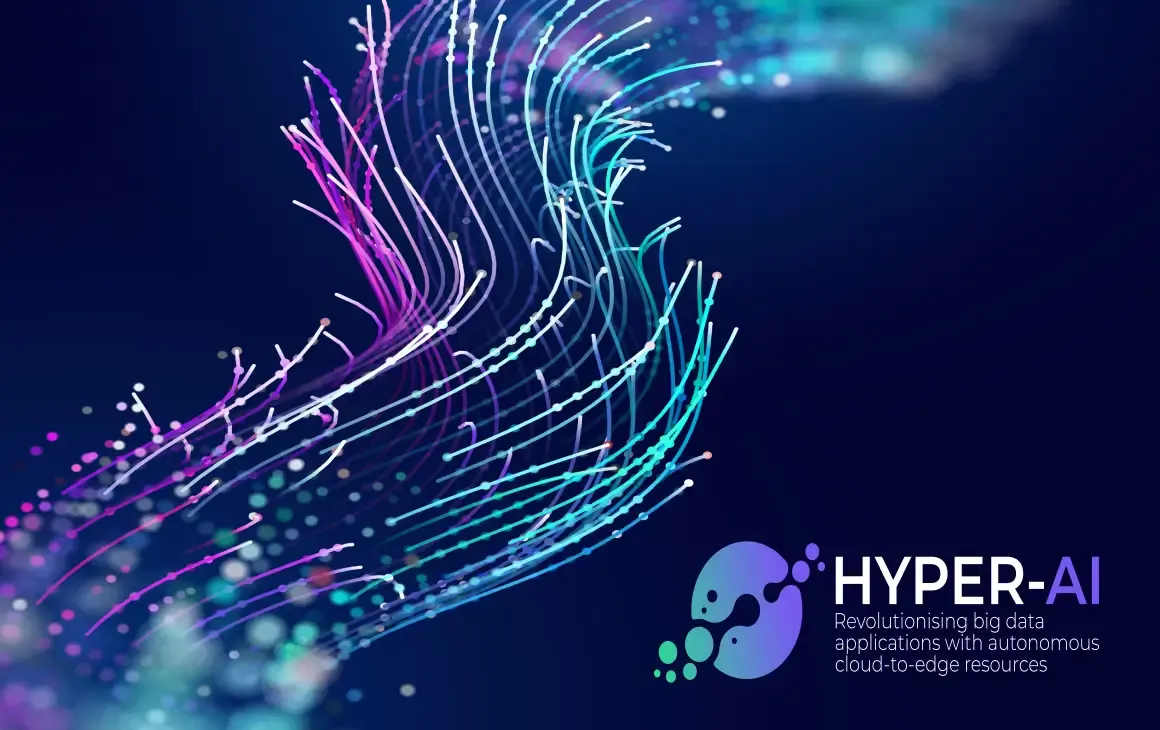Launch of HYPER-AI project to establish foundations for new-generation hybrid computing ecosystems
23, April, 2024
·3 minutes read
·HYPER-AI

The HYPER-AI project, funded under the European Commission HORIZON-CL4-2023-DATA-01 programme, launched on the 1 April 2024 to run for 36 months.
Since its inception in the 2000s, the Internet of Things (IoT) has long surpassed billions of interconnected devices. Constant improvement in networking and processing across the whole network means that the nascent IoT-edge-cloud continuum of today already contains vast amounts of processing power. However, without a way of coordinating this network to behave efficiently as a computing swarm, this resource will remain underutilised.
HYPER-AI will tackle the extreme complexity of orchestrating resource utilisation of the IoT-Edge-Cloud continuum by developing the mid-tier and cloud-edge connectors necessary to integrate billions of devices, of various types, into a powerful hybrid computing ecosystem. The network resource automation and management of hyper-distributed hybrid computing ecosystems will be achieved with the development of AI models, to surpass today’s limitations for managing such networks.
Towards this end, HYPER-AI’s consortium, coordinated by CERTH, comprises a multi-disciplinary team with expertise across complementary domains, from national and international projects in both private and public sectors. The team will collaborate on a Hyper-Distributed AI Platform for Network Resources Automation and Management, with the goal of dramatically improving the efficiency of data processing applications that are run on the network. The successful development of HYPER-AI solutions will result from the interaction of the following R&D domains:
- Cloud and Edge Systems: cloud infrastructure providers, ICT and IoT experts, and RTOs specialised in networking and OS domains will develop system related solutions for Cloud-to-Edge networking and abstraction, as well as the implementation of such systems.
- Applied sciences: RTOs, SMES, and industries, that are specialised in distributed and multi-agent optimization and distributed-ledgers for security and privacy, will collaborate on generating algorithms and software tools for managing the data that HYPER-AI collects, while focussing on computing resource optimization and configuration.
- Social sciences: in order to understand the needs of project stakeholders and HYPER-AI users, and ensure that the solutions developed by the project are fully and widely accepted, the consortium’s expertise in social sciences will be employed towards stakeholder engagement, clustering, training, and sectoral studies.
- Business: HYPER-AI solutions will ensure the reduction of infrastructure investments and operations costs to create a friendly hosting environment for hyper-distributed data processing applications across different industry domains.
The benefits of the HYPER-AI platform will impact industries and industry verticals where data processing networks can be improved through smarter resource management. As examples, the following use cases have already been identified:
- Industry 4.0 (manufacturing): for SABO SA, a designer and manufacturer of specialised industrial robotic machinery, the application of the HYPER-AI platform will focus on facilitating, expediting, and minimising costs for remote equipment assembly operations, and exploring the potential of the Robot-as-a-Service model.
- Green energy: for nuclear power plants, the HYPER-AI computing continuum will serve to manage increased safety and security requirements, by developing improved response actions to simulated incidents.
- Mobility and automotive: mobilising the edge computing power that is already present in highly automated vehicles during downtime (while recharging, parked, or not in use overnight), and which already meets prerequisites for shared resource use, HYPER-AI’s application will create the opportunity to offer what would otherwise be an idle computing resource as a service.
- Farming and agriculture: optimising resource utilisation with HYPER-AI will contribute to achieving the zero-wastage target for water, fertilisers, crops, and other natural resources.
- Healthcare: in light of the COVID-19 pandemic, improving bonds between critical infrastructures will contribute towards preparedness towards future pandemic crises.
To keep up to date and for more information on HYPER-AI, follow the project on LinkedIn, Twitter, and YouTube.